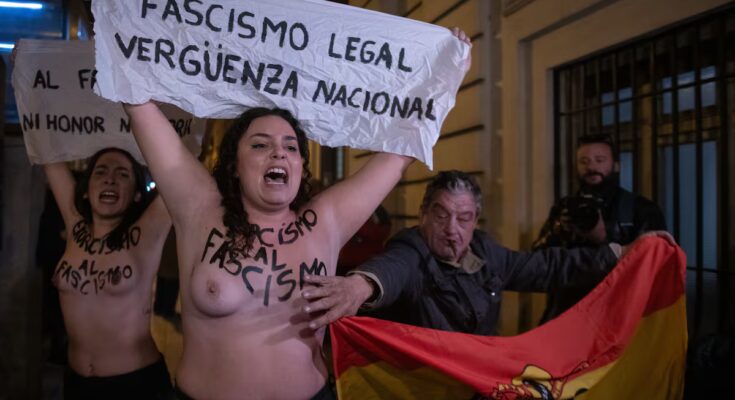The Minister of Equality, Ana Redondo, criticized this Friday the attack suffered by two Femen activists who were protesting at the end of a mass in honor of the dictator Francisco Franco on Thursday afternoon: “How unpunished must one feel to attack two women in front of the cameras?” In statements to the media at a conference on gender violence in Zamora, Redondo also called for “the full weight of the law to fall” on the aggressor.
The minister described what happened as a “live attack” and a “radically terrible” gesture, as it represents an attempt to “go back” rights. “There are people who, unfortunately, continue to want Francoism and a society where women are subjugated and where they can be attacked,” she said, and expressed hope that the perpetrator “will end up where it has to end up.”
The two activists protested this Thursday in the parish of the Twelve Apostles in Madrid. At the doors of the temple, both were shown bare-chested and carrying banners reading the slogans “To fascism, no honor, no glory” and “Legal fascism, national shame”.
The action, they explained, was intended to denounce the “normalization of acts of Francoist glorification” in public spaces. The intervention was peaceful, they underline, but it was a man, a street vendor merchandising with Francoist and Phalangist iconography, they chased them through the audience and touched their breasts in front of the cameras. “Sir, don’t touch, don’t touch,” protested the activists, who also received pushes and insults.
For her part, the political secretary of Podemos and former minister of Equality, the MEP Irene Montero, asked to defend the law of only yes is yes. Montero underlined in an interview with TVE that what happened shows that some men “are too used to considering these acts of sexual violence normal” and attacked what he calls the “sexist right”, which he accuses of being contrary to the right to sexual freedom because “it takes away their power”.
This Friday, Femen also released a statement on social networks in which it contextualized its protest on the fiftieth anniversary of Franco’s death. “Our activists raided with the aim of denouncing the normalization of acts of Francoist glorification and reminding us that no full democracy should allow spaces in which speeches of this type are legitimised,” they underline.
The group stressed that its action was “non-violent, faithful to the spirit of Femen activism”. And he attacked the persistence of Francoist symbols and tributes. “50 years later, fascism is still alive,” they begin. “They don’t intimidate us. Our fight is for human rights, feminism and democratic memory. As long as the symbols and figures of the dictatorship continue to be honored, we will continue to raise our voices. One more year, we have proven it.”
It is not the first time that the group has suffered an attack of this type during a protest on 20N. In 2018, three Femen activists stormed an event organized in Madrid’s Plaza de Oriente by the Association for the Repeal of Historical Memory on the occasion of the anniversary of Franco’s death. They did it to denounce that this type of act continues to be legal. One of those who tried to neutralize the activists, pushing and shouting “whores”, was Manuel Andino, national head of the Falange. At the time, the group also filed charges of sexual abuse for allegedly grabbing one of its members by the breast during her detention.
How unpunished you must feel to attack two women in front of the cameras. 50 years have passed and there are those who have learned nothing, but society in general has and we no longer allow women to be abused or a dictator to be admired. Our bodies are ours. https://t.co/OzJpLqaB52
— Ana Redondo (@_anaredondo_) November 21, 2025



